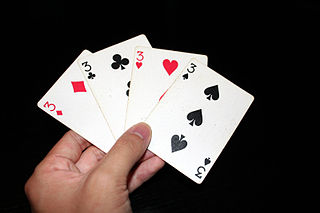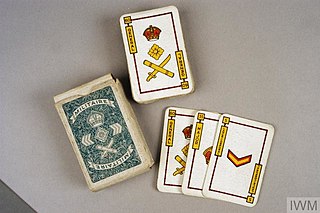
Gin rummy, or simply gin, is a two-player card game variant of rummy. It has enjoyed widespread popularity as both a social and a gambling game, especially during the mid twentieth century, and remains today one of the most widely-played two-player card games.
Seven-card stud, also known as Seven-Toed Pete or Down-The-River, is a variant of stud poker. Before the 2000s surge of popularity of Texas hold 'em, seven-card stud was one of the most widely played poker variants in home games across the United States, and in casinos in the eastern part of the country. Although seven-card stud is not as common in casinos today, it is still played online. The game is commonly played with two to eight players, though eight may require special rules for the last cards dealt if no players fold. With experienced players who fold often, playing with nine players is possible.

Shithead is a card game, the object of which is to lose all of one's playing cards. Although the basic structure of the game generally remains constant, there are regional variations to the game's original rules.

Robbers' rummy is a card game for two or more players. It is a variant of German Rummy dating to the early 20th century. Being derived from normal rummy, it emphasises arrangement of cards based on card matching rules, while abandoning the notions of card discards and scoring entirely.

Skitgubbe, and also called Mas, Mjölis, Mjölnarmatte, or Flurst, is a popular Swedish card game that is rated as one of the best for three players. It has two phases: in the first, players accumulate cards; in the second players aim to discard the accumulated hand. The last player to go out is the skitgubbe. Sometimes, the skitgubbe must make a goat noise.

500 rum, also called pinochle rummy, Michigan rummy, Persian rummy, rummy 500 or 500 rummy, is a popular variant of rummy. The game of canasta and several other games are believed to have developed from this popular form of rummy. The distinctive feature of 500 rum is that each player scores the value of the sets or cards they meld. It may be played by 2 to 8 players, but it is best for 3 to 5.
Marjapussi is a traditional Finnish trick taking game for 4 players playing in 2 partnerships and is one of the Mariage family, its key feature being that the trump suit is determined in the middle of the play by declaring a marriage. There are variants of Marjapussi for two and three players.

Rummy is a group of games notable for similar gameplay based on matching cards of the same rank or sequence and same suit. The basic goal in any form of rummy is to build melds which can be either sets or runs and either be first to go out or to amass more points than the opposition.

Shanghai rum is a Rummy card game, based on gin rummy and a variation of Contract rummy played by 3 to 8 players. It is also known as California rummy.

Kings in the Corner, or King's Corners is a multi-player patience or solitaire-style card game for two to four players using a standard 52-card pack with the aim of each player to get rid of all the cards in their hand.

Liverpool rummy is a multi-player, multi-round card game similar to other variants of rummy that adds features like buying and going out. It is played the same as Contract rummy, except that if a player manages to cut the exact number of cards required to deal the hand and leave a face-up card, then the cutting player's score is reduced by 50 points.

Contract rummy is a Rummy card game, based on gin rummy played by 3 to 8 players. It appeared in the United States during the Second World War. The game is also known as Combination rummy, Deuces Wild Rummy and Joker rummy, and a proprietary version of the game called Phase 10 was published in 1982.

Militaire was a bespoke card game of the Rummy family for three or four players in which the playing cards depicted badges of rank of the British Army. According to the Imperial War Museum it dates to the interwar period or Second World War, while other sources suggest it was made in the 1940s and 1950s. It came in two sizes: a standard size in an ordinary box and a pocket sized version in a cardboard wallet. The game is no longer manufactured.

Four color cards is a game of the rummy family of card games, with a relatively long history in southern China. In Vietnam the equivalent game is known as tứ sắc.

Continental Rummy is a progressive partnership Rummy card game related to Rumino. It is considered the forerunner of the whole family of rummy games using two packs of cards as one. Its name derives from the fact that it is played throughout the continental Europe, the United States, Mexico, Canada, and also in South America. According to Albert Morehead, it was "at one time the most popular form of Rummy in women's afternoon games, until in 1950 it lost out to Canasta."
One-card is a shedding-type card game. The general principles put it into the crazy eights family. It is played with an ordinary poker deck and the objective is for a player to empty their own hand while preventing other players from emptying theirs. The game is commonly played in South Korea, Finland and The Netherlands.

Kalooki or Kaluki is a card game popularly played in Jamaica,. It is sometimes called Jamaican Rummy for similarities in structure the game bears with Contract Rummy or Gin Rummy. The games are, however, different and not to be confused.
Buraco is a Rummy-type card game in the Canasta family for four players in fixed partnerships in which the aim is to lay down combinations in groups of cards of equal rank and suit sequences, there being a bonus for combinations of seven cards or more. Buraco is a variation of Canasta which allows both standard melds as well as sequences. It originated from Uruguay and Argentina in the mid-1940s, with apparent characteristics of simplicity and implications that are often unforeseeable and absolutely involving. Its name derives from the Portuguese word "buraco" which means “hole”, applied to the minus score of any of the two partnerships. The game is also popular in the Arab world, specifically in the Persian Gulf; where it is known as 'Baraziliya' (Brazilian). Another popular variation of Buraco is Italian.
Stud poker is any of a number of poker variants in which each player receives a mix of face-down and face-up cards dealt in multiple betting rounds. Stud games are also typically non-positional games, meaning that the player who bets first on each round may change from round to round. The cards dealt face down to each individual player are called hole cards, which gave rise to the common English expression ace in the hole for any hidden advantage.

Marriage is a Rummy card game widely played in India. It uses three or more packs of playing cards.










